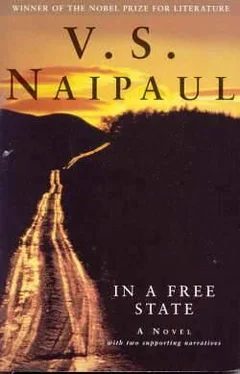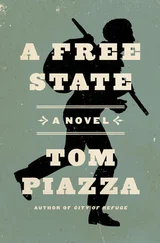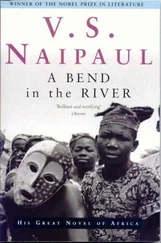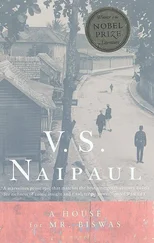Vidiadhar Naipaul - In A Free State
Здесь есть возможность читать онлайн «Vidiadhar Naipaul - In A Free State» весь текст электронной книги совершенно бесплатно (целиком полную версию без сокращений). В некоторых случаях можно слушать аудио, скачать через торрент в формате fb2 и присутствует краткое содержание. Жанр: Современная проза, на английском языке. Описание произведения, (предисловие) а так же отзывы посетителей доступны на портале библиотеки ЛибКат.
- Название:In A Free State
- Автор:
- Жанр:
- Год:неизвестен
- ISBN:нет данных
- Рейтинг книги:5 / 5. Голосов: 1
-
Избранное:Добавить в избранное
- Отзывы:
-
Ваша оценка:
- 100
- 1
- 2
- 3
- 4
- 5
In A Free State: краткое содержание, описание и аннотация
Предлагаем к чтению аннотацию, описание, краткое содержание или предисловие (зависит от того, что написал сам автор книги «In A Free State»). Если вы не нашли необходимую информацию о книге — напишите в комментариях, мы постараемся отыскать её.
«V. S. Naipaul tells stories which show us ourselves and the reality we live in. His use of language is as precise as it is beautiful.» – The London Times
«A Tolstoyan spirit…The so-called Third World has produced no more brilliant literary artist.» – John Updike, The New Yorker
«The coolest literary eye and the most lucid prose we have.» – The New York Review
In A Free State — читать онлайн бесплатно полную книгу (весь текст) целиком
Ниже представлен текст книги, разбитый по страницам. Система сохранения места последней прочитанной страницы, позволяет с удобством читать онлайн бесплатно книгу «In A Free State», без необходимости каждый раз заново искать на чём Вы остановились. Поставьте закладку, и сможете в любой момент перейти на страницу, на которой закончили чтение.
Интервал:
Закладка:
Bobby thought he detected one of Martin's bitter _mots__. But he only said, 'If you put it like that, perhaps there isn't news anywhere.'
'I don't want to argue. I believe you know what I mean.'
'We'll stop at Esher for petrol.'
She said, in half-apology, 'I have a slight head.'
She took her bag from the floor and put it on her knees, looked at her face in her hand mirror and said, 'Good Lord.' Briskly, as though banishing the mood, she made up her face; without weariness, she rearranged her hair and retied her scarf, her arms still young, the short sleeves of her shirt opening to show the mole in her shaved armpit. Then she put on her dark glasses, sat back in her seat and looked quite composed.
Bobby was hating her.
ESH, the milestones had been promising every two miles, E S H. And now at last the board – of English design: it might have been imported from England – said ESHER. But there was still only wilderness.
Then old pine trees grew behind wire fences; tractor-marked dirt tracks met the highway in flurries of melting mud. And it was wilderness again. The hills rose in humps on one side; the highway twisted. A washed-out board gave insufficient warning of a level-crossing; the car was jolted. Tall eucalyptus trees made an open, dripping grove, tattered bark on straight trunks; and, against the great mountains in the distance, the rising hills showed a mixture of fenced pastures, hummocked open land, eucalyptus windbreaks, old forest patches: an unfinished landscape, a scratching in the continent.
The verges widened; a few tarnished villas were set in large gardens. There was a roundabout, its garden still maintained, and the highway entered the town. Cross-streets, each with a new black-and-white board bearing the name of a minister in the capital, could be seen to end in mud after two or three hundred yards. The town had been built to grow. It hadn't grown. It remained a collection of old tin-and-timber buildings, its pioneer flimsiness pointed by the small new bank building, the motor car and tractor showroom. The mud-splashed police barracks, low white concrete sheds flat to the ground, already looked like the hutments of the African quarter in the capital.
The filling station Bobby turned into belonged to an oil company that had come to the country after independence. A tall yellow-and-black board announced the amenities in bold international symbols. But one of the symbols, the telephone, had been partly covered over with a square of brown paper; and another symbol, the crossed knife and fork, had been crossed out, apparently by a finger dipped in engine oil. Along the lower edge of the yellow board, as on the white walls of the office, were the marks of oily fingers and sometimes whole hands that had tried to wipe or roll themselves clean. The covered part of the asphalted yard was black with oil; the exposed part, still wet after the rain, was iridescent.
Four Africans in old blue dungarees that looked like cast-offs watched the car come in. When Bobby stopped outside the covered area and sounded his horn, all four Africans started; but then, looking at one another, all four hesitated. One of the Africans was very small; his dungarees dropped low at the crotch and were thick with turn-ups at the ankles.
'I'll go and risk the Ladies',' Linda said.
She walked with fussy little steps, keeping her head down. Her trousers were baggy below the knee and there was a long blot of perspiration on her shirt between the shoulder blades.
The small African and another African came to the car, the small African kicking out at every step, fighting the encumbrance of his dungarees. The small African carried a bucket, a sponge and a metal-handled cleaner. Silently he began to clean the car windows.
Linda came back. 'The place is locked.'
The big African dipped into his pocket and held out a greasy Yale key between a greasy thumb and forefinger. Linda took the key without comment and walked away briskly again.
Oil, petrol, water, battery, tyres: Bobby anxiously superintended and encouraged the big African. He used his simple friendly voice· and he laughed a lot. The African was too preoccupied to respond. When Linda came back, Bobby went silent. Self-possessed, hard to read behind her dark glasses, she stood at the edge of the asphalted yard, looking across the road to the hills and the mountains.
At last Bobby paid, and he and Linda got back in the car.
While they waited for change they were aware of the small African, the cleaner, darkening one window, then another. Linda's forehead began to twitch; she sighed. The big African came with the change. If she sighs again like that, Bobby thought, I'll give her a piece of my mind. The African counted out the change coin by coin into Bobby's hand. It was too much; it was more than Bobby had given.
'It's pathetic,' Linda whispered.
The small African moved from Linda's window to Linda's side of the windscreen. He pulled back the wiper in an alarming way and began to clean, his face level with Linda's and just a few inches away. He frowned, doing his work, making a point of not looking at her.
She looked down at her lap and whispered, 'It's pathetic.'
If she uses that word again, Bobby thought, I'll hit her. He was counting back the excess change into the patient cupped palm of the big African, and he was deliberately counting in his friendly simple voice. He paid out the last coin, which included a tip, and smiled at the African. The big African went away, and the small African came round with his bucket to Bobby's side of the windscreen.
Linda said, 'Look what this one's been doing.'
Bobby looked at Linda's side of the windscreen. Then he looked at the small African. The African was using a doubleedged cleaner, one edge made of rubber, one edge made of sponge; but both sponge and rubber had perished, and he was rubbing the central bar of metal on the windscreen. He had left a complicated trail of deep scratches on the windows all around the car. Scratching away now, not looking at Bobby, he frowned, to show his intentness.
Bobby saw the fineness of the African's features, the special, dead blackness of the skin, and recognized him as a man of the king's tribe. Bobby was at once deeply angry. The African aware of Bobby's scrutiny, frowned harder.
'What on earth do you think you're doing?'
Bobby pushed the door open so violently that the African was hit and thrown off balance.
The African recovered and scrambled away from the car. He said, 'What?' and opened his mouth to say more. But then he just looked at Bobby with shocked, liquid eyes, the disintegrating large sponge in his left hand, the metal-handled cleaner still in his right.
'Look at what you've done,' Bobby shouted. 'You've ruined my windscreen. You've ruined all my windows. You've knocked several hundred shillings off the resale value. Who's going to give me that? You?'
'Insurance,' the African said. And again he seemed about to say something else; but the words didn't come.
'Oh yes, you are very clever. Like all your people. You always know. Insurance? I want it back from you.'
Bobby took a step towards the African. The African stepped back, awkward in his dungarees.
The three other Africans stood still, in their dingy blue dungarees, one next to the door of the office, against the white wall, one in front of the yellow board, one beside the petrol pump. 'I'm going to have you sacked,' Bobby said. 'Sent back to your people. Who's the manager here?'
The African standing against the white office wall raised his hand. He was the man with whom Bobby had dealt, the man who had given the change. He hesitated, then he came towards Bobby. He stood a few feet away, held his hands behind his back and said, 'Manager.'
Company policy, clearly; but Bobby doubted whether this manager had it in his power to recruit and sack.
Читать дальшеИнтервал:
Закладка:
Похожие книги на «In A Free State»
Представляем Вашему вниманию похожие книги на «In A Free State» списком для выбора. Мы отобрали схожую по названию и смыслу литературу в надежде предоставить читателям больше вариантов отыскать новые, интересные, ещё непрочитанные произведения.
Обсуждение, отзывы о книге «In A Free State» и просто собственные мнения читателей. Оставьте ваши комментарии, напишите, что Вы думаете о произведении, его смысле или главных героях. Укажите что конкретно понравилось, а что нет, и почему Вы так считаете.











